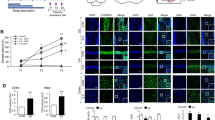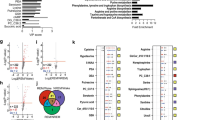Abstract
Several lines of evidence suggest that sleep deprivation disrupts cognitive and emotional abilities and changes the expression of distinctive categories of genes in the brain. In the present study, saline- or MLC901 (a traditional Chinese medicine)-treated male Wistar rats were first submitted to a modified water box (for 24-h sleep deprivation) and then trained in contextual and tone fear conditioning tasks with the purpose to evaluate the effect of MLC901 during sleep deprivation on fear memory retention. Hippocampal mRNA measurement was performed by reverse transcription-polymerase chain reaction (RT-PCR). We found that the exposure of rats to 24 h of sleep deprivation impaired contextual and tone fear memory retention, while administration of MLC901 (0.2, 0.4, and 0.8 mg/kg, once/12 h; i.p.) during sleep deprivation abolished memory deficits. Meanwhile, different doses of MLC901 alone had no effect on performance in both tasks. We observed that MLC901 increased the expression levels of pro-apoptotic BAD, anti-apoptotic Bcl-xL, and Tfam as an index of mitochondrial biogenesis compared to sleep-deprived rats, while MLC901 during sleep deprivation increased BAX, BAD, and Bcl-xL compared to the control group. Sleep deprivation decreased BAX and Tfam, by itself. MLC901 only decreased BAX and Tfam and increased BAD level compared to the non-sleep-deprived control group. It is suggested that MLC901 might be a therapeutic option for memory impairment during sleep deprivation.




Similar content being viewed by others
References
Andersen ML, Perry JC, Tufik S (2005) Acute cocaine effects in paradoxical sleep deprived male rats. Prog Neuro-Psychopharmacol Biol Psychiatry 29:245–251. https://doi.org/10.1016/j.pnpbp.2004.11.007
Andreazza AC, Andersen ML, Alvarenga TA, de-Oliveira MR, Armani F, Ruiz FS, Giglio L, Moreira JCF, Kapczinski F, Tufik S (2010) Impairment of the mitochondrial electron transport chain due to sleep deprivation in mice. J Psychiatr Res 44:775–780. https://doi.org/10.1016/j.jpsychires.2010.01.015
Bessey AF, Powers Armstrong M, Prindle NE, et al (2018) 0236 Changes in state anxiety over 62 hours of sleep deprivation and subsequent recovery. Sleep 41:A91–A92. https://doi.org/10.1093/sleep/zsy061.235
Chen Y, Wu X, Yu S, Lin X, Wu J, Li L, Zhao J, Zhao Y (2012) Neuroprotection of tanshinone IIA against cerebral ischemia/reperfusion injury through inhibition of macrophage migration inhibitory factor in rats. PLoS One 7:e40165. https://doi.org/10.1371/journal.pone.0040165
Cirelli C, Shaw PJ, Rechtschaffen A, Tononi G (1999) No evidence of brain cell degeneration after long-term sleep deprivation in rats. Brain Res 840:184–193
D’Almeida V, Hipolide DC, Azzalis LA et al (1997) Absence of oxidative stress following paradoxical sleep deprivation in rats. Neurosci Lett 235:25–28
Dlugosz PJ, Billen LP, Annis MG, Zhu W, Zhang Z, Lin J, Leber B, Andrews DW (2006) Bcl-2 changes conformation to inhibit Bax oligomerization. EMBO J 25:2287–2296. https://doi.org/10.1038/sj.emboj.7601126
Eydipour Z, Vaezi G, Nasehi M, Haeri-Rouhani SA, Zarrindast MR (2017) Different role of CA1 5HT3 serotonin receptors on memory acquisition deficit induced by total (TSD) and REM sleep deprivation (RSD). Arch Iran Med 20:581–588 0172009/AIM.006
Franke TF, Kaplan DR, Cantley LC (1997) PI3K: downstream AKTion blocks apoptosis. Cell 88:435–437
Guan Z, Peng X, Fang J (2004) Sleep deprivation impairs spatial memory and decreases extracellular signal-regulated kinase phosphorylation in the hippocampus. Brain Res 1018:38–47. https://doi.org/10.1016/j.brainres.2004.05.032
Halonen JD, Zoladz PR, Park CR, Diamond DM (2016) Behavioral and neurobiological assessments of predator-based fear conditioning and extinction. J Behav Brain Sci 06:337–356. https://doi.org/10.4236/jbbs.2016.68033
Havekes R, Park AJ, Tudor JC, Luczak VG, Hansen RT, Ferri SL, Bruinenberg VM, Poplawski SG, Day JP, Aton SJ, Radwańska K, Meerlo P, Houslay MD, Baillie GS, Abel T (2016) Sleep deprivation causes memory deficits by negatively impacting neuronal connectivity in hippocampal area CA1. elife. https://doi.org/10.7554/eLife.13424.001,5
Heurteaux C, Gandin C, Borsotto M, Widmann C, Brau F, Lhuillier M, Onteniente B, Lazdunski M (2010) Neuroprotective and neuroproliferative activities of NeuroAid (MLC601, MLC901), a Chinese medicine, in vitro and in vivo. Neuropharmacology 58:987–1001. https://doi.org/10.1016/j.neuropharm.2010.01.001
Hipolide DC, D’Almeida V, Raymond R et al (2002) Sleep deprivation does not affect indices of necrosis or apoptosis in rat brain. Int J Neurosci 112:155–166
Javad-Moosavi BZ, Vaezi G, Nasehi M, Haeri-Rouhani SA, Zarrindast MR (2017) Critical role of CA1 muscarinic receptors on memory acquisition deficit induced by total (TSD) and REM sleep deprivation (RSD). Prog Neuro-Psychopharmacology Biol Psychiatry 79:128–135. https://doi.org/10.1016/j.pnpbp.2017.05.024
Kao T-K, Chang C-Y, Ou Y-C, Chen WY, Kuan YH, Pan HC, Liao SL, Li GZ, Chen CJ (2013) Tetramethylpyrazine reduces cellular inflammatory response following permanent focal cerebral ischemia in rats. Exp Neurol 247:188–201. https://doi.org/10.1016/j.expneurol.2013.04.010
Koh P-O (2013) Ferulic acid attenuates the injury-induced decrease of protein phosphatase 2A subunit B in ischemic brain injury. PLoS One 8:e54217. https://doi.org/10.1371/journal.pone.0054217
Krause AJ, Ben SE, Mander BA et al (2017) The sleep-deprived human brain. Nat Rev Neurosci 18:404–418. https://doi.org/10.1038/nrn.2017.55
Lee WT, Chen C, Hsian L et al (2017) The effects of MLC901 on tau phosphorylation. Neuroreport 28:1043–1048. https://doi.org/10.1097/WNR.0000000000000884
Lorivel T, Gandin C, Veyssiere J et al (2015) Positive effects of the traditional Chinese medicine MLC901 in cognitive tasks. J Neurosci Res 93:1648–1663. https://doi.org/10.1002/jnr.23591
McDermott CM, LaHoste GJ, Chen C et al (2003) Sleep deprivation causes behavioral, synaptic, and membrane excitability alterations in hippocampal neurons. J Neurosci 23:9687–9695
Moha Ou Maati H, Borsotto M, Chatelain F, Widmann C, Lazdunski M, Heurteaux C (2012) Activation of ATP-sensitive potassium channels as an element of the neuroprotective effects of the traditional Chinese medicine MLC901 against oxygen glucose deprivation. Neuropharmacology 63:692–700. https://doi.org/10.1016/j.neuropharm.2012.05.035
Montes-Rodriguez CJ, Alavez S, Soria-Gomez E et al (2009) BCL-2 and BAX proteins expression throughout the light-dark cycle and modifications induced by sleep deprivation and rebound in adult rat brain. J Neurosci Res 87:1602–1609. https://doi.org/10.1002/jnr.21987
Nair D, Zhang SXL, Ramesh V, Hakim F, Kaushal N, Wang Y, Gozal D (2011) Sleep fragmentation induces cognitive deficits via nicotinamide adenine dinucleotide phosphate oxidase-dependent pathways in mouse. Am J Respir Crit Care Med 184:1305–1312. https://doi.org/10.1164/rccm.201107-1173OC
Nam KN, Kim K-P, Cho K-H, Jung WS, Park JM, Cho SY, Park SK, Park TH, Kim YS, Lee EH (2013) Prevention of inflammation-mediated neurotoxicity by butylidenephthalide and its role in microglial activation. Cell Biochem Funct 31:707–712. https://doi.org/10.1002/cbf.2959
Nasehi M, Mosavi-Nezhad S-M, Khakpai F, Zarrindast M-R (2018) The role of omega-3 on modulation of cognitive deficiency induced by REM sleep deprivation in rats. Behav Brain Res 351:152–160. https://doi.org/10.1016/j.bbr.2018.06.002
Norozpour Y, Nasehi M, Sabouri-Khanghah V, Torabi-Nami M, Zarrindast MR (2016) The effect of CA1 α2 adrenergic receptors on memory retention deficit induced by total sleep deprivation and the reversal of circadian rhythm in a rat model. Neurobiol Learn Mem 133:53–60. https://doi.org/10.1016/j.nlm.2016.06.004
Onen SH, Alloui A, Eschalier A, Dubray C (2000) Vocalization thresholds related to noxious paw pressure are decreased by paradoxical sleep deprivation and increased after sleep recovery in rat. Neurosci Lett 291:25–28
Onen SH, Alloui A, Gross A, Eschallier A, Dubray C (2001) The effects of total sleep deprivation, selective sleep interruption and sleep recovery on pain tolerance thresholds in healthy subjects. J Sleep Res 10:35–42
Oudiette D, Antony JW, Creery JD, Paller KA (2013) The role of memory reactivation during wakefulness and sleep in determining which memories endure. J Neurosci 33:6672–6678. https://doi.org/10.1523/JNEUROSCI.5497-12.2013
Pfaffl MW (2002) Relative expression software tool (REST(C)) for group-wise comparison and statistical analysis of relative expression results in real-time PCR. Nucleic Acids Res 30:36e–36. https://doi.org/10.1093/nar/30.9.e36
Pinho N, Moreira KM, Hipolide DC, Sinigaglia-Coimbra R, Ferreira TL, Nobrega JN, Tufik S, Oliveira MGM (2013) Sleep deprivation alters phosphorylated CREB levels in the amygdala: relationship with performance in a fear conditioning task. Behav Brain Res 236:221–224. https://doi.org/10.1016/j.bbr.2012.08.043
Pires GN, Tufik S, Andersen ML (2013) Grooming analysis algorithm: use in the relationship between sleep deprivation and anxiety-like behavior. Prog Neuro-Psychopharmacol Biol Psychiatry 41:6–10. https://doi.org/10.1016/j.pnpbp.2012.11.006
Quintard H, Borsotto M, Veyssiere J, Gandin C, Labbal F, Widmann C, Lazdunski M, Heurteaux C (2011) MLC901, a traditional Chinese medicine protects the brain against global ischemia. Neuropharmacology 61:622–631. https://doi.org/10.1016/j.neuropharm.2011.05.003
Quintard H, Lorivel T, Gandin C, Lazdunski M, Heurteaux C (2014) MLC901, a traditional Chinese medicine induces neuroprotective and neuroregenerative benefits after traumatic brain injury in rats. Neuroscience 277:72–86. https://doi.org/10.1016/j.neuroscience.2014.06.047
Rossi VC, Tiba PA, Moreira KDM, Ferreira TL, Oliveira MGM, Suchecki D (2014) Effects of sleep deprivation on different phases of memory in the rat: dissociation between contextual and tone fear conditioning tasks. Front Behav Neurosci 8:389. https://doi.org/10.3389/fnbeh.2014.00389
Ruskin DN, Liu C, Dunn KE (2004) Sleep deprivation impairs hippocampus-mediated contextual learning but not amygdala-mediated cued learning in rats. Eur J 19:3121–3124. https://doi.org/10.1111/j.1460-9568.2004.03426.x
Siow CHC (2008) Neuroaid in stroke recovery. Eur Neurol 60:264–266. https://doi.org/10.1159/000155220
Tang Q, Han R, Xiao H, Shen J, Luo Q, Li J (2012) Neuroprotective effects of tanshinone IIA and/or tetramethylpyrazine in cerebral ischemic injury in vivo and in vitro. Brain Res 1488:81–91. https://doi.org/10.1016/j.brainres.2012.09.034
Walker MP, Stickgold R (2006) Sleep, memory, and plasticity. Annu Rev Psychol 57:139–166. https://doi.org/10.1146/annurev.psych.56.091103.070307
Yang R-H, Hu S-J, Wang Y, Zhang WB, Luo WJ, Chen JY (2008) Paradoxical sleep deprivation impairs spatial learning and affects membrane excitability and mitochondrial protein in the hippocampus. Brain Res 1230:224–232. https://doi.org/10.1016/j.brainres.2008.07.033
Zhuang P, Zhang Y, Cui G, Bian Y, Zhang M, Zhang J, Liu Y, Yang X, Isaiah AO, Lin Y, Jiang Y (2012) Direct stimulation of adult neural stem/progenitor cells in vitro and neurogenesis in vivo by salvianolic acid B. PLoS One 7:e35636. https://doi.org/10.1371/journal.pone.0035636
Zielinski MR, Davis JM, Fadel JR, Youngstedt SD (2013) Influence of chronic moderate sleep restriction and exercise training on anxiety, spatial memory, and associated neurobiological measures in mice. Behav Brain Res 250:74–80. https://doi.org/10.1016/j.bbr.2013.04.038
Author information
Authors and Affiliations
Contributions
AM acquired the animal data and wrote the manuscript. MN, ME, MH, and MZ were responsible for the study concept, design, and proteomics analysis as well as assisted with the data analysis and interpretation of findings. All authors critically reviewed the content and approved the final version for publication.
Corresponding authors
Ethics declarations
The study was carried out in accordance with ethical standards in all aspects.
Conflict of interest
The authors declare that they have no conflict of interest.
Additional information
Publisher’s note
Springer Nature remains neutral with regard to jurisdictional claims in published maps and institutional affiliations.
Rights and permissions
About this article
Cite this article
Nasehi, M., Mohammadi, A., Ebrahimi-Ghiri, M. et al. MLC901 during sleep deprivation rescues fear memory disruption in rats. Naunyn-Schmiedeberg's Arch Pharmacol 392, 813–821 (2019). https://doi.org/10.1007/s00210-018-01612-z
Received:
Accepted:
Published:
Issue Date:
DOI: https://doi.org/10.1007/s00210-018-01612-z




